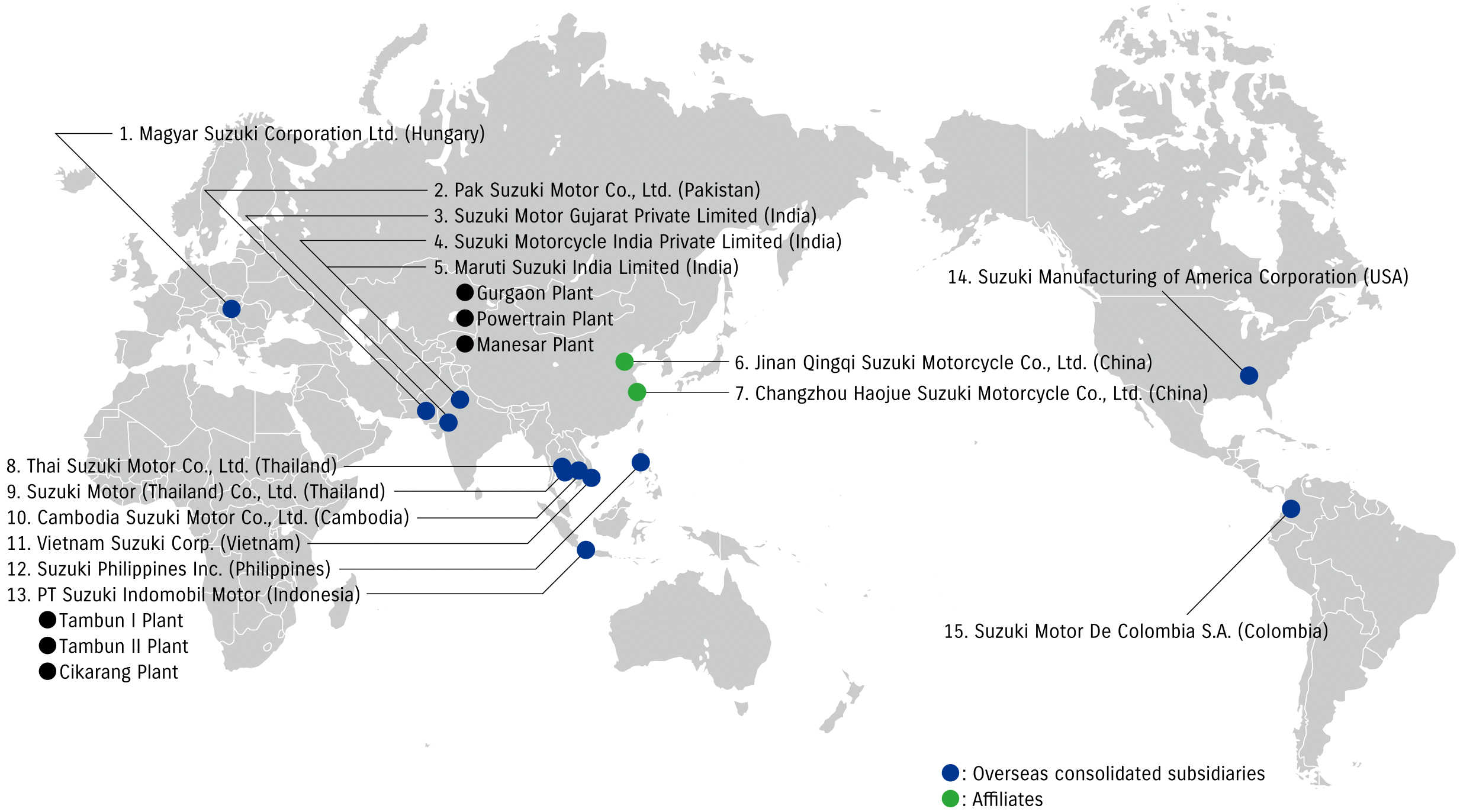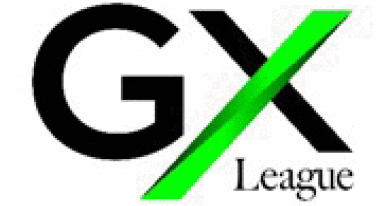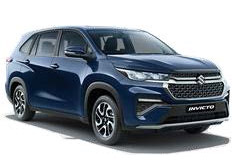- Sustainability
- Environment
-
Environmental Policy and Management
- Mid- to Long-Term Targets and Results
- Environmental Policy and Management
- Climate Change
- Air Conservation
- Water Resources
- Resource Circulation
- Chemical Substances
- Biodiversity
Environmental Policy and Management
-
Introduction of Environmental Management System
-
Environmental Training and Awareness
-
Situation Concerning Environmental Laws and Regulations
-
Community Information Exchange Meetings
-
Information Disclosure
-
Participation in Outside Associations, etc.
-
Cooperation with Other Companies in the Industry
-
Environmental Impact and Initiatives in Business Activities
Introduction of Environmental Management System
Suzuki is promoting the introduction of ISO 14001 as part of its environmental conservation efforts. ISO 14001 is an international standard for environmental management systems. By obtaining ISO 14001 certification, Suzuki intends to comply with environmental laws and regulations and reduce environmental impact.
94%* of all factories of Suzuki Motor Corporation and its domestic and overseas manufacturing subsidiaries (which account for more than 99% of global CO2 emissions from manufacturing) have obtained ISO14001 certification.
*Out of the total 20 companies and 33 factories, 18 companies and 31 factories have obtained certification.
In April 1998, Magyar Suzuki became the first in the Suzuki Group to acquire ISO 14001 certification. By March 2003, all domestic Suzuki plants had acquired ISO 14001 certification. Of our domestic manufacturing subsidiaries, all 10 factories across 4 companies have obtained ISO14001 certification. Additionally, 13 overseas manufacturing subsidiaries (17 factories) and 2 overseas affiliates (2 factories) have obtained ISO14001 certification. In January 2023, our head office, including offices and development areas acquired ISO 14001 certification. We will also promote steady introduction of ISO 14001 at our domestic offices and development sites, etc. In addition, at the head office, we are strengthening environmental initiatives by conducting double audits, an external audit by an auditing organization and an internal audit, annually.
■Suzuki and domestic consolidated subsidiaries that have obtained ISO 14001 certification

(As of June 2025)
■Overseas consolidated subsidiaries and affiliates that have obtained ISO 14001 certification

(As of June 2025)
Environmental Training and Awareness
Employee training
As part of our employee development program, we incorporate basic environmental education into the training of new employees, including Suzuki's environmental philosophy, environmental policy, environmental issues, and eco-driving promotion. We also provide environmental training according to respective operations and positions. In order to prevent environmental accidents, each domestic factory provides its own training to workers involved in environmentally important processes, as well as introductory training for new employees, training for managers, and general training.
Situation Concerning Environmental Laws and Regulations
In FY2024, there were 6 cases of significant spills* and 5 cases of environmental complaints, all of which were properly taken care of. There was no administrative guidance or payment of penalties due to these significant spills.
[Scope of aggregation]
Head office, Iwata Plant, Kosai Plant, Osuka Plant, Sagara Plant, Hamamatsu Plant
*Significant spills: Spills that are recorded as spills from an organization, such as wastewater, emission gas, odors, chemical substances (including oil), and waste that exceed legal and regulatory limits, as well as soil and groundwater contamination.
Community Information Exchange Meetings
We hold information exchange meetings with local residents to ask their views and opinions on improving our activities.
Information Disclosure
To spread awareness and understanding of our environmental initiatives among our stakeholders, we disclose our environmental technologies online, in booklets and other media, and through participation in environment-related exhibitions and events.

A snapshot taken at an event
Participation in Outside Associations, etc.
Cooperation with various economic and industry associations
Suzuki is a member of associations such as the Japan Business Federation and the Japan Automobile Manufacturers Association and cooperates with these organizations to tackle problems to achieve a sustainable society.
Suzuki dispatches committee members to various committees, subcommittees, and working groups at the Japan Automobile Manufacturers Association to participate in comprehensive activities. We view climate change as particularly a critical issue, and are working in unison with the Japan Automobile Manufacturers Association to reduce CO2 emissions by improving fuel efficiency, developing next-generation vehicles, improving traffic flow, and promoting eco-driving.
Support for the TCFD*
As a supporter of the TCFD*, Suzuki has endorsed and signed the TCFD recommendations and promotes disclose of information that is easy for stakeholders to understand. To further strengthen our resilience to climate change, we are working to improve our scenario analysis and enhance the information we disclose.
*TCFD: Task Force on Climate-related Financial Disclosures
Web: https://www.fsb-tcfd.org/supporters/
Participation in the GX League*

In April 2023, Suzuki joined the GX League promoted by the Ministry of Economy, Trade and Industry.
The GX League is a forum for companies that are taking on the challenge of GX (Green Transformation) and aiming to achieve sustainable growth in current and future society, with an eye toward achieving carbon neutrality and social change by 2050, and to collaborate with other companies and government and academic organizations engaged in similar initiatives.
By participating in this league, we will accelerate our efforts to realize a carbon-neutral society through collaboration with industry, government, and academia.
*Please check here for details on the GX League:
https://gx-league.go.jp
Cooperation with Other Companies in the Industry
Alliance with Toyota Motor Corporation
Our alliance with Toyota Motor Corporation remains a partnership between equals who are also partners as well as competitors that seek to push each other to improve. Through collaboration in areas such as technology, production, and mutual vehicle supply, we are advancing activities with Toyota to realize a carbon neutral society along multiple pathways.
Technical area
- Advanced safety technologies such as collision damage reducing brakes
- Joint development of BEV units and platforms
Production area
- Suzuki's newly developed Grand Vitara will be produced at TKM*1 and supplied to India, the Middle East and Africa.


- ®Dentsu Creative ®Toyota Kirloskar Motor Private Ltd.
Mutual supply vehicles
Mutual supply of vehicles in India, Africa, Europe and Japan*2
[Suzuki ->Toyota]
e VITARA (vehicles developed by Suzuki using jointly developed BEV units and platforms)
Baleno, Ertiga, Fronx, Ciaz, Celerio
[Toyota ->Suzuki]
Landy, Invicto, Across, and Swace
- *1 TKM: Toyota Kirloskar Motor (India)
- *2 Both models are from Suzuki

Environmental Impact and Initiatives in Business Activities

- *1 [Scope of aggregation] Iwata Plant, Kosai Plant, Osuka Plant, Sagara Plant, Tooling Dept., and Hamamatsu Plant (PRTR substances include the Head Office, Ryuyo Proving Grounds, Marine Technical Center, Shimokawa Proving Grounds, and Sagara Proving Grounds, but exclude the Tooling Department; ozone-depleting substances are included at Suzuki Motor Corporation's domestic business sites)
- *2 Calculated based on emission coefficients under Japan’s Mandatory Greenhouse Gas Accounting and Reporting System (Electricity is based on basic emission coefficients for each electricity provider.)
- *3 CO2 emissions are for five plants: Iwata Plant, Kosai Plant, Osuka Plant, Sagara Plant and Hamamatsu Plant.
- *4 As for ozone-depleting substances, the refrigerant R-22 (chlorodifluoromethane) was extracted from the total results based on the Act on Rational Use and Appropriate Management of Fluorocarbons (Fluorocarbon Emissions Control Act).
- *5 Ozone depleting potential is based on the Act on the Protection of the Ozone Layer Through the Control of Specified Substances and Other Measures (Ozone Layer Protection Act).
- *6 Recycling rate calculated based on weight

 Japan
Japan
